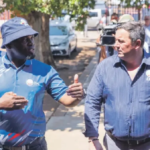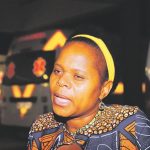Julius Malema's grip on the Economic Freedom Fighters (EFF) is being tested, with whispers of a power struggle brewing ahead of the party's upcoming December conference.
Sources close to the party reveal that Malema's decision to reject a plum deal to join the government of national unity (GNU) was driven by a fear of being toppled as EFF president.
The deal, negotiated by EFF lieutenants Floyd Shivambu and Mbuyiseni Ndlozi, offered the party four ministerial positions and at least four deputy ministerial positions. It was a significant offer for a party that had slipped to fourth place in the national elections.
"The team went back to brief Malema, who seemed to be happy about it. However, the EFF negotiating team was surprised when Malema called a press conference the next day to announce that the party wouldn’t be part of the GNU," said a source close to the ANC delegation.
Sources say Malema's paranoia stemmed from the belief that Shivambu and Ndlozi, with their government portfolios, would use their newfound power and resources to challenge his leadership.
"Someone whispered in Julius’ ear that the two leaders would become too powerful and would topple him because they’d have resources as government ministers. As a minister of higher education, Ndlozi was seen to be the one who’d be growing powerful, with a department which had students, the National Student Financial Aid Scheme and other resources,” said the source.
The source added that both the ANC and EFF delegations were shocked by Malema's rejection of the offer.
"We only learnt when we made follow-ups that Julius wasn’t interested in the offer, because Shivambu and Ndlozi had already been offered positions in the GNU,” said the insider.
Malema's fear of being challenged is not new.
"Remember what he said at the 10th anniversary gala dinner in Kempton Park, where he warned Floyd that he’d never lost a conference and that he was ruthless to those who challenged him. This was a continuation of that," said a party leader.
The fallout from Malema's decision was significant. The EFF missed out on a chance to influence government policy and gain valuable experience in running a ministry. The party's decision also frustrated Shivambu, who believed that joining the GNU would have been a positive move for the red berets.
In a bid to salvage the deal, Ndlozi was offered an MEC position in Gauteng, but Malema again rejected the offer.
The tension within the EFF is palpable, with Malema's recent speeches seen as thinly veiled attacks on his potential rivals. In a fiery address to the Gauteng Provincial Ground Forces Forum, Malema called on leaders who were waiting for the third national assembly to leave at once.
"We mustn’t bother ourselves about what our enemies are saying, but we must ask ourselves: ‘Why are those who claim to be our comrades silent? Why are those who’re popular and most vocal on social media suddenly silent? Where are their voices when our movement’s under attack?’"
The source said Malema's speech had also been used to attack Ndlozi, whose partner, Mmabatho Montsho, was one of the well-known people who had liked Shivambu's posts about the MKP.
"If there are those among us who’re ashamed to declare where they stand as we defend our movement, I’m willing to give you a simple task: go and look at what those closest to them are saying and how they’re behaving,” said Malema.
Malema's pronouncements have fuelled speculation that a leadership battle is brewing within the EFF. The party's student wing, the EFFSC, has been quick to rally behind Malema, seeking to counter Shivambu's influence on young members.
EFFSC president Sihle Lonzi said that the command planned to mobilise its members across the provinces in an effort to lessen potential panic, following Shivambu’s departure.
"These things happen and the show must continue," Lonzi said.
While the EFFSC leadership did not concede that it was worried about how Shivambu’s resignation from the party would affect its student members, it has embarked on a mission to ensure that they close ranks.

Follow Us on Twitter











